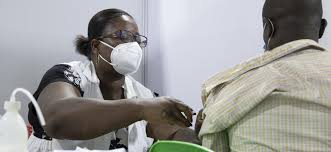
Introduction
The COVID-19 pandemic illuminated the vulnerabilities within global health systems, including those in African nations. While the virus did not ravage Africa as severely as it did in other regions, the continent’s response was nevertheless hindered by systemic weaknesses, inadequate infrastructure, and a shortage of medical personnel. As we approach 2026, African countries must confront these challenges head-on to build resilient health systems that can withstand future pandemics. This article critically assesses the current status of pandemic preparedness in Africa, identifies the challenges the continent faces, and suggests strategies for improving preparedness and response capabilities.
For more: https://africaciviclens.com/
1. The Current Status of Pandemic Preparedness in Africa
- a) Health Infrastructure
The quality of health infrastructure in many African countries remains a significant concern. The continent faces a shortage of healthcare facilities, diagnostic tools, and essential medical supplies. According to the World Health Organization (WHO), Africa has just 1.3 healthcare workers per 1,000 people, a stark contrast to the global average of 3.7. The COVID-19 pandemic exacerbated these limitations, with countries like South Africa and Nigeria overwhelmed by the scale of the health crisis.
Efforts are being made to improve this situation. The African Union (AU) and the Africa Centres for Disease Control and Prevention (Africa CDC) have initiated regional health security frameworks. However, these efforts are often impeded by a lack of political will and insufficient financial investment. The pandemic revealed that many African nations, despite their efforts, were unprepared in terms of medical equipment, ICU beds, and basic hygiene supplies.
- b) Early Warning Systems
Early warning systems, designed to detect and manage outbreaks before they escalate, are critical in reducing the burden of pandemics. The Africa CDC has developed early warning and response mechanisms, such as the Integrated Disease Surveillance and Response (IDSR) system, which has been effective in detecting threats like Ebola. Despite these efforts, many African countries still struggle with implementing such systems uniformly across the continent. The lack of reliable data collection and real-time surveillance systems in rural areas continues to be a significant challenge.
The success of the Ebola containment in West Africa (2014-2016) highlighted the importance of early intervention. This experience demonstrated that timely data and effective communication can save lives. However, the challenges of ensuring that these systems work at full capacity in every African country persist.
- c) Emergency Response Mechanisms
A coordinated response is essential when managing a pandemic. During the COVID-19 pandemic, some African countries, such as Rwanda and Ethiopia, displayed impressive leadership, quickly mobilizing resources and taking proactive measures, including lockdowns and community-based awareness programs. However, in many regions, emergency response plans were underdeveloped, and there was insufficient coordination between local governments, national governments, and international organizations.
For example, in countries like Zimbabwe and Guinea, governance challenges, including corruption, hindered the speed and efficiency of response efforts. The fragmentation of health responses across different regions further complicated containment measures, and the absence of a unified response framework often led to delays in mobilizing resources.
2. Key Challenges to Pandemic Preparedness in Africa
- a) Funding and Resources
One of the most significant challenges African nations face in terms of pandemic preparedness is the lack of adequate funding. According to the African Development Bank (AfDB), the continent spends only 1.5% of its GDP on health, which is significantly below the recommended 5% set by the WHO. The inadequate financial allocation to the health sector restricts the ability to strengthen health systems, improve medical infrastructure, and procure essential supplies.
Moreover, many African countries rely heavily on foreign aid for healthcare funding. This external dependence, while vital, is not a sustainable long-term strategy for pandemic preparedness. The COVID-19 crisis underscored the need for African nations to create domestic funding mechanisms to better prepare for health emergencies.
- b) Political and Governance Issues
Political instability and poor governance are major obstacles to pandemic preparedness in several African countries. In nations experiencing conflict or political unrest, such as the Democratic Republic of Congo (DRC), South Sudan, and Somalia, it becomes nearly impossible to build the necessary infrastructure for effective pandemic response. Additionally, corruption and a lack of transparency often plague the allocation of resources, which undermines public trust in health institutions and impedes the efficient distribution of aid.
For instance, during the Ebola outbreak in the DRC, governance issues, including corruption in the healthcare system, delayed the effective response and contributed to the spread of the virus. These challenges demonstrate the importance of political stability, transparency, and good governance in strengthening health systems.
- c) Health Workforce Challenges
Africa’s healthcare workforce is severely understaffed, with the continent accounting for only 3% of the world’s healthcare workers, despite having 17% of the global population. The situation is exacerbated by the “brain drain,” where highly trained medical professionals migrate to developed countries for better pay and working conditions. This migration further depletes the already limited workforce available to address health crises.
Moreover, there is a need for continuous training and capacity-building programs to ensure that healthcare professionals are adequately prepared for emergencies. Many countries still face a shortage of trained personnel in areas like epidemiology, intensive care, and public health management, which limits their ability to respond effectively to pandemics.
3. Strategies to Improve Pandemic Preparedness by 2026
- a) Strengthening Health Systems
To ensure better preparedness by 2026, African governments must prioritize strengthening their health systems. This includes increasing investments in infrastructure, improving healthcare worker salaries and conditions, and expanding access to essential medical supplies. A shift towards decentralized health systems will also help reach rural areas, where healthcare access remains limited.
Governments should work to expand public-private partnerships (PPPs) to increase investment in healthcare. This could involve incentivizing the private sector to invest in healthcare infrastructure and innovations such as diagnostic tools, vaccines, and telemedicine.
- b) Regional Collaboration
Pandemic preparedness requires coordinated efforts across borders. The Africa CDC has made strides in fostering regional collaboration through initiatives such as the Africa Health Strategy 2016-2030. However, many countries are still struggling to implement these frameworks effectively.
There is a pressing need for stronger regional collaboration to ensure a unified response to pandemics. The AU should increase its coordination efforts, ensuring that countries share resources, knowledge, and expertise. Additionally, cross-border partnerships and joint training programs for health professionals can improve overall preparedness and reduce the response time during outbreaks.
- c) Capacity Building and Workforce Development
To address the shortage of healthcare workers, African governments must invest in training programs that focus on epidemic response, disease surveillance, and public health management. More medical schools should be established across the continent to produce local health professionals, and partnerships with international organizations could support the development of specialized training programs in epidemiology and other critical fields.
It is also vital to create incentives to retain medical professionals within the continent. Competitive salaries, improved working conditions, and career development opportunities are essential to prevent the brain drain and ensure that Africa has a robust health workforce.
- d) Public Health Campaigns
Public health education and awareness campaigns are vital to preventing the spread of infectious diseases. During the COVID-19 pandemic, countries like Senegal, Kenya, and Ghana were able to effectively use media platforms and local leaders to raise awareness about health protocols such as mask-wearing and social distancing.
These campaigns should continue and be expanded to ensure that every African citizen has access to timely information. Community-based health education programs are especially important in rural and remote areas where information is often scarce.
- e) Strengthening Emergency Response Frameworks
Governments must develop and regularly update comprehensive emergency preparedness plans. These plans should involve local communities, national health authorities, and international organizations in the decision-making process. Regular simulation exercises and mock drills can help identify weaknesses in emergency response systems and enhance the readiness of health workers and policymakers.
- Technological Innovations in Pandemic Preparedness
Technological innovations are increasingly recognized as a pivotal force in improving health system responses, particularly in regions with limited infrastructure such as Africa. The COVID-19 pandemic has illuminated the critical need for Africa to embrace modern technologies to enhance its preparedness for future health emergencies. In the face of rising health threats, ranging from infectious diseases to potential future pandemics, technological solutions can provide the means to bolster Africa’s ability to respond quickly, effectively, and sustainably. From telemedicine and digital health records to AI-driven disease tracking, technological advances offer immense potential in augmenting pandemic preparedness on the continent.
a) Digital Health Solutions
Digital health technologies, encompassing telemedicine, mobile health (mHealth) applications, and electronic health records, are transformative tools that have revolutionized healthcare delivery, particularly during pandemics. Africa, with its diverse geography, complex healthcare challenges, and a young population increasingly mobile and digitally connected, stands to benefit greatly from digital health interventions. These tools can bridge the vast healthcare access gaps, facilitate rapid responses to outbreaks, and reduce the strain on overburdened health systems.
Telemedicine: One of the most promising digital health solutions is telemedicine, which allows patients to access healthcare services remotely, often via video calls or messaging platforms. This becomes particularly vital during a pandemic when mobility is restricted, and social distancing is necessary. During the COVID-19 pandemic, telemedicine platforms in several African countries, such as Kenya, Nigeria, and South Africa, allowed individuals in urban and rural areas to continue receiving medical consultations without the need to physically visit healthcare facilities. This has been particularly beneficial for non-urgent consultations, mental health support, and the management of chronic conditions.
In rural and underserved regions of Africa, where access to medical professionals can be extremely limited, telemedicine eliminates geographical barriers. Healthcare providers, including doctors, nurses, and specialists, can consult with patients in real time, diagnose conditions, offer advice, and even prescribe medications, all without requiring an in-person visit. Telemedicine is also instrumental in alleviating the burden on overcrowded healthcare facilities during an outbreak. It ensures that only those who need urgent care are physically present in hospitals, while others can receive guidance remotely.
Mobile Health (mHealth) Apps: Mobile health applications, often integrated with telemedicine, have become powerful tools for managing healthcare during pandemics. These apps are used for various purposes, including tracking symptoms, providing information on disease prevention, and managing healthcare appointments. During the COVID-19 pandemic, African countries utilized mHealth apps to share information about COVID-19 safety protocols, vaccination centers, and pandemic-related policies. In Ghana, for instance, the government partnered with mobile network providers to launch an app that allowed citizens to access COVID-19-related information, book vaccinations, and report symptoms.
More than just a tool for information dissemination, mHealth apps can provide critical functionality in pandemic scenarios. For example, mobile applications can assist in contact tracing—a crucial step in preventing the spread of contagious diseases. Apps can be used to log individuals’ movements, identify contacts, and notify users if they have been in close contact with someone who has tested positive for a contagious disease. By enabling rapid identification and quarantine of at-risk individuals, mHealth apps help contain outbreaks before they spiral out of control. These applications also improve real-time data collection, which is critical for monitoring disease spread and assessing the effectiveness of response measures.
Artificial Intelligence (AI) and Data Analytics: AI and data analytics can play a pivotal role in predicting and tracking disease outbreaks, particularly in a continent as vast and diverse as Africa. AI-powered models can analyze vast amounts of data from health records, social media, mobile phone usage, and environmental factors to identify patterns that may signal the emergence of a pandemic. These tools allow for early detection of potential health threats, enabling health authorities to initiate timely interventions.
AI technologies can also assist in diagnosis during pandemics, automating the process of identifying diseases through medical imaging, laboratory results, and symptom checkers. In Africa, where there is often a shortage of skilled medical professionals, AI can support healthcare workers by providing assistance in interpreting test results, diagnosing diseases like malaria, tuberculosis, or COVID-19, and prioritizing cases for treatment based on severity.
Moreover, AI can be crucial in resource allocation during pandemics. Data-driven decision-making supported by AI models can optimize the distribution of scarce resources like medical supplies, vaccines, and healthcare workers to areas with the highest need. AI can help identify the most vulnerable populations, enabling governments and international organizations to prioritize interventions more effectively.
Electronic Health Records (EHRs): The transition to electronic health records (EHRs) across African health systems is another essential step toward improving pandemic preparedness. EHRs allow health providers to quickly access comprehensive patient histories, ensuring better diagnoses and more coordinated treatment plans, especially during a pandemic. EHRs also enable more efficient data collection and tracking, crucial for monitoring disease progression and managing vaccination campaigns.
While many African nations have started adopting digital health records, the implementation remains uneven. Infrastructure challenges, such as limited internet connectivity and inadequate electricity supply, hinder the widespread use of EHRs, especially in rural areas. Nonetheless, the African Union and initiatives like the African Medicines Agency (AMA) have recognized the importance of digital health solutions and are working to scale them across the continent to improve health system responsiveness.
b) Vaccine Development and Distribution
One of the most pressing concerns for Africa in terms of pandemic preparedness is the continent’s reliance on foreign vaccine suppliers. During the COVID-19 pandemic, African countries faced delays in vaccine access, with rich nations securing the majority of global vaccine supplies through advanced purchase agreements. This inequitable distribution of vaccines exposed the vulnerabilities of relying solely on external sources for vital medical supplies.
As Africa looks toward the future, investing in local vaccine production is crucial to reducing this dependency and ensuring timely access to vaccines in times of crisis. The African Union’s Africa CDC and initiatives such as the African Medicines Agency (AMA) are working towards creating a sustainable vaccine manufacturing capacity on the continent. These efforts are not just about building infrastructure; they involve training the workforce, establishing regulatory frameworks, and securing investment from both public and private sectors.
The AMA, for example, aims to harmonize vaccine regulatory standards across African countries, making it easier for pharmaceutical companies to produce and distribute vaccines within the region. By fostering collaborations with global vaccine manufacturers and research institutions, the AMA also seeks to boost local innovation and improve Africa’s self-sufficiency in health emergencies.
Furthermore, technology transfer agreements between African countries and established vaccine manufacturers can accelerate the continent’s ability to produce vaccines. The Serum Institute of India, for instance, was involved in transferring mRNA technology to several African nations to boost local vaccine production. These collaborations are critical in ensuring that vaccines are not only produced locally but are affordable and accessible to all African citizens, especially in low-income areas.
However, it’s not enough to only focus on vaccine production. Logistical challenges—particularly the transportation and distribution of vaccines to remote areas—also need to be addressed. A robust cold chain supply system is essential for ensuring that vaccines remain effective from the point of manufacture to the final recipient. Africa’s poor infrastructure in this area presents a significant challenge, but innovative solutions are emerging. Drones, for example, have been used in Rwanda to deliver medical supplies, including vaccines, to hard-to-reach areas. This model, if scaled, could significantly improve the distribution of vaccines during pandemics.
Mobile health technologies also play a role in vaccine distribution. In countries like Kenya and Nigeria, mHealth apps can be used to register citizens for vaccination programs, provide updates on vaccine availability, and even monitor vaccine uptake. By integrating mobile technology into vaccine campaigns, governments can track progress, address vaccine hesitancy through education, and ensure equitable distribution across both urban and rural populations.
Lastly, global collaboration in vaccine production and distribution remains essential for Africa’s pandemic preparedness. The COVAX initiative, aimed at ensuring equitable vaccine access, is a prime example of how international collaboration can address disparities in healthcare access. However, as the world emerges from COVID-19, Africa must focus on strengthening its internal vaccine production capabilities, ensuring that the continent is better prepared for future health emergencies.
Technological innovations in digital health solutions and vaccine production are pivotal in enhancing Africa’s pandemic preparedness. The COVID-19 pandemic highlighted the urgent need for robust digital infrastructure to support remote healthcare, disease tracking, and real-time data collection. Additionally, local vaccine production capabilities are essential to mitigate the vulnerability of relying on foreign suppliers, ensuring equitable access to vaccines, and addressing the continent’s specific health needs.
As Africa moves toward 2026, it is essential for governments, international organizations, and the private sector to invest in digital health technologies and local manufacturing capabilities. With the right combination of innovation, investment, and collaboration, Africa can significantly improve its preparedness and response capabilities, ensuring better outcomes in the face of future pandemics.
- The Role of International Support
International cooperation remains critical for Africa’s pandemic preparedness. The COVID-19 pandemic demonstrated that health threats transcend national borders, requiring collective action. International organizations such as the WHO, the World Bank, and the Global Fund play an essential role in providing funding, technical assistance, and policy guidance.
African countries should leverage these partnerships to secure financial and technical support for pandemic preparedness. At the same time, there must be an emphasis on ensuring equitable access to resources, particularly in vaccine distribution, to prevent health disparities across the continent.
- Conclusion
As we move toward 2026, Africa faces both challenges and opportunities in its pursuit of better pandemic preparedness. Strengthening health systems, enhancing regional cooperation, and investing in human capital are critical steps in building resilience to future health crises. African governments, in partnership with international organizations, must prioritize these areas to safeguard the health and well-being of their populations. The time to act is now, and with the right policies, investments, and collaborative efforts, Africa can emerge more resilient and better equipped to handle future pandemics.
External Sources for Further Reading:
- World Health Organization (WHO) – Pandemic Preparedness in Africa
https://www.who.int/news-room/fact-sheets/detail/pandemic-preparedness - Africa CDC – Regional Health Security
https://africacdc.org/ - GAVI – The Vaccine Alliance
https://www.gavi.org/ - World Bank – Health Systems Strengthening in Africa
https://www.worldbank.org/en/topic/health - UNICEF – Strengthening Health Systems
https://www.unicef.org/
The post by:
https://afripoli.org





